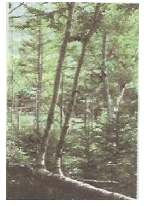Advertisements
Advertisements
प्रश्न

A big tree falls in a forest but its roots are still in contact with the soil.
The branches of this fallen tree grow straight up (vertically). This happens in response to ______.
विकल्प
water and light
water and minerals
gravity and water
light and gravity
उत्तर
A big tree falls in a forest but its roots are still in contact with the soil.
The branches of this fallen tree grow straight up (vertically). This happens in response to light and gravity.
Explanation:
It is because a plant stem grows towards the light in the upward direction against the force of gravity.
APPEARS IN
संबंधित प्रश्न
How do auxins promote the growth of a tendril around a support?
Give the scientific terms used to represent the Growth of a pollen tube towards ovule.
Define chemotropism.
Define phototropism. Give one example of phototropism.
Name five stimuli which act on plants. Name the type of tropism produced by each one of these stimuli.
What is the difference between thigmotropism and thigmonasty? Name one plant which exhibits thigmotropism and one plant which exhibits thigmonasty. What behaviour (or responses) of these plants make you think that they exhibit thigmotropism and thigmonasty respectively?
Which of the following acts as a stimulus in the process of hydrotropism?
(a) hydrocarbon
(b) hydrogen oxide
(c) hydrogen chloride
(d) hydrogen peroxide
The chemical substance P is made and secreted by the meristematic tissue at the tip of stem (or shoot) of a plant. The chemical substance P is responsible for a phenomenon Q in plants in which the stem bends towards a source of light. The same chemical substance P has an opposite effect on the root of a plant. It causes the root of a plant to bend away from the source of light in a process called R.
(a) What is the chemical substance P?
(b) State whether P prefers to remains in the sunlit side of a stem or in shade.
(c) What is the effect of substance P on the rate of growth of (i) a root, and (ii) a stem?
(d) What is the name of process (i) Q, and (ii) R?
(e) What is the general name of chemical substances like P? Name another substance which belongs to this class of chemical substances.
The growth of tendrils in pea plants is due to
Give an example of negative hydrotropism.
